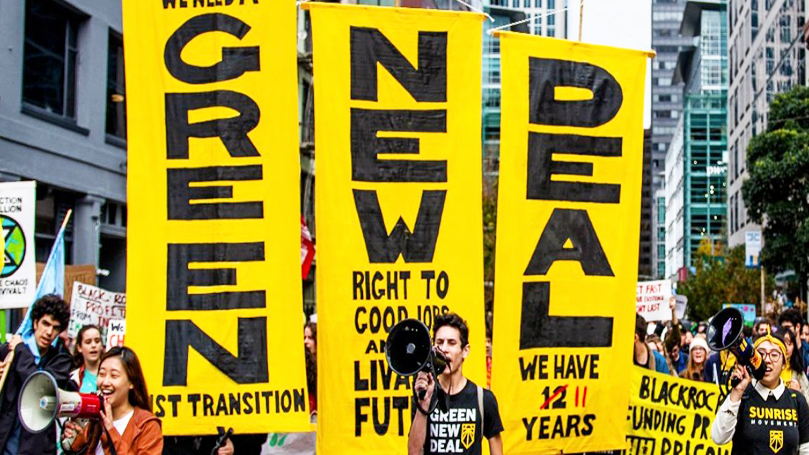
Get out the trumpets. Roll out the drums. David Brooks has just announced that he was wrong about . . . capitalism! In an op-ed prompted by a New York Times “assignment” in which columnists were asked to write about what they were wrong about, Brooks said that he didn’t see the “inequalities” being generated by capitalism. He admitted that he was constantly “behind” developments.
What? This is the same David Brooks who soft-pedals capitalism on public TV every week and through his column at the NYT. How can this be? Should we expect Mr. Brooks to repent for peddling the war in Ukraine? After all, U.S. imperialism is capitalism on global steroids.
Don’t hold your breath. But we certainly can help Mr. Brooks add to his list of what’s wrong with capitalism. We can even suggest a long-term solution.
For example, let’s go to the recent Supreme Court ruling on the Environmental Protection Agency (EPA) and power plants. Just like the Supreme Court ruling blocking women’s right to choose, this ruling, which curtails the EPA’s ability to regulate power plant emissions, creates chaos. It’s chaos with a definitive reactionary direction.
Let’s focus on the latter ruling and see if we can help Mr. Brooks see the inequalities there.
Power plants contribute 25% of greenhouse gases, mostly carbon dioxide, that cause climate change. There’s much more involved with fossil-fuel power plant emissions: also spewed out are nitrogen oxides, sulfur oxides, and particulate matter. Asthma and other respiratory problems are caused and exacerbated by these air pollutants. Here’s where the inequality comes in: sizable populations of people of color live in the vicinity of power plants, according to the EPA.
The main legal tool used by environmental groups to pressure EPA to control power plant emissions is the Clean Air Act of 1963. It was amended in 1990. The key section of the act is 111D. All legal precedents to date have been to strengthen the Act and therefore lead us to cleaner air.
So how did the Supreme Court put a straightjacket on the EPA’s authority to use section 111D of the Clean Water Act? They used a little-known legal theory called the Major Questions Doctrine. The doctrine is so obscure that this was the first time it was used by a majority of the Supreme Court.
This radical right-wing court claimed that the EPA may not regulate emissions because Congress didn’t directly give them the authority to do so. And when an issue involves significant national policy (major questions), only Congress can give authority to the EPA to set regulatory standards. Translation — don’t you dare try to transition the country to green energy, away from fossil fuels, and mega profits.
The Major Questions Doctrine played a similar function as did the legal notion of “ordered liberty” in Dobbs v. Jackson Women’s Health Organization. Ordered liberty means “freedom limited by the need for order in society,” and the Supreme Court invoked it (sixteen times!) to sink women’s right to choose. It attempts to put the administration in a legal bind. The Court says that the buck stops not with the administration but with the Court itself. What “order” means and which freedoms should be restricted are now up to the six reactionary justices.
Fundamentally, and most important, this is an attack on democracy. The many precedents supporting the Clean Air Act and section 111D were the products of grassroots struggles and victories over many decades as well as the establishment of the Act in the 1960s. Because of that background, the response has been quick and furious by environmental and climate justice groups.
A chorus of environmental groups is calling for President Biden to declare a climate emergency. The Sunrise Movement has played a role activating youth. They are calling on Biden to use the Defense Production Act to speed up the transition to renewable energy. To date, he has been doing the opposite.
The Food and Water Action group demands the following.
- Declare a national climate emergency
- Halt the approval of new fossil fuel projects
- Stop fossil fuel exports
- End fossil fuel leasing on federal lands
- Launch a just, equitable renewable energy revolution
“Just, equitable renewable energy revolution” needs to be spelled out. For example, the demand for reparations for African Americans with a connection to slavery is on the table in California. According to a 2020 study, 19 of the 20 most polluted counties were in California. Any reparations, with a climate justice component, should include an option to relocate to environmentally healthy areas, for example, near passive open space, nature preserves, and wildlife refuges.
Of course, we’ll have to fight this fight over and over until we have democracy at the grassroots via Bill of Rights Socialism.
Then David Brooks will not have to “catch up” and be “wrong” about capitalism again.
Under Bill of Rights Socialism, Mr. Brooks will not have to worry about the current inequalities animating climate justice struggles. Transformational, environmentally conscious, working-class forces, from the shops and neighborhoods where these power plants are located, will be regulating carbon emissions as we jump-start the transition to green energy.
The opinions of the author do not necessarily reflect the positions of the CPUSA.
Image: Sunrise Movement (Facebook).


 Join Now
Join Now